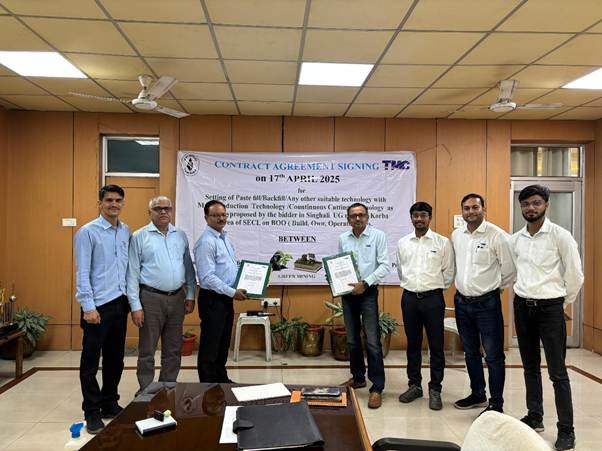Ministry considering Coal Trading Exchange, informs Reddy
The Government has approved an Rs.8,500 crore incentive scheme to support coal gasification projects across public and private sectors as part of a key strategy for energy security, with a target of 100 million tonnes from gasification by 2030 http://coal.nic.in.
This update was given by Minister of Coal and Mines G Kishan Reddy, who also informed that the Ministry is considering the establishment of a Coal Trading Exchange to create a competitive and transparent market, further modernizing the sector.
Further, the introduction of the National Coal Mine Safety Report Portal and the Mine Closure Portal ensures responsible and transparent mining practices, he added http://coalindia.in.
The coal sector’s transformation is marked by policy-driven reforms, sustainable initiatives, and technological advancements, ensuring energy security while prioritizing environmental responsibility, said Reddy.
“Through these efforts, India is paving the way for a resilient, self-sufficient, and sustainable future in coal production and energy supply.”
The Ministry of Coal is committed to ensuring a robust, efficient, and sustainable coal sector that supports India’s economic growth and energy security, he assured. “Through policy reforms, production enhancements, and environmental initiatives, the Ministry continues to drive progress towards a self-reliant coal industry https://www.worldcoal.com/.”
Addressing the media 7 Feb, the minister highlighted the progress made by the Ministry.
He listed the achievements:
To ensure uninterrupted coal supply, robust institutional mechanisms have been put in place, including an Inter-Ministerial Committee and coordination meetings with Railways and power sector stakeholders. As a result, coal stock at TPPs now stands at 49 MT—sufficient for nearly 21 days, even amidst logistical restrictions during the Maha Kumbh period https://sbi.com.in/.
To further enhance supply efficiency, the Ministry has launched the First Mile Connectivity (FMC) initiative, commissioning 39 projects with a total capacity of 386 MTPA. Additionally, the Rail-Sea-Rail (RSR) mode has successfully doubled coal movement from 28 MT in FY 2022 to 54 MT in FY 2024 https://www.nseindia.com/.
The coal sector remains a cornerstone of India’s energy security, playing a vital role in the country’s industrial and economic growth.
With the fifth-largest geological coal reserves globally and as the second-largest consumer, coal continues to be an indispensable energy source, contributing to 55% of the national energy mix. Approximately 74% of power generation in India relies on Thermal Power Plants (TPPs), reaffirming the need for a robust and sustainable coal sector, said the Minister https://www.bseindia.com/.
Between April and November 2024, coal imports declined by 5.35%, saving approximately US$3.91 billion (Rs.30,007.26 crore). Notably, coal imports for domestic power plant blending fell by 23.56%.
The Ministry’s ‘Mission Coking Coal’ aims to increase domestic coking coal production to 140 MT by FY 2029-30, thereby reducing dependency on imports in the steel sector.
India’s coal production has reached an all-time high of 997.82 million tonnes (MT) in FY 2023-24, marking a significant rise from 609.18 MT in FY 2014-15, with a Compound Annual Growth Rate (CAGR) of 5.64% over the past decade. In FY 2023-24 alone, production has surged by 11.71% compared to the previous year https://www.conexpoconagg.com/.
A landmark policy reform came with the introduction of commercial coal mine auctions in 2020, encouraging private sector participation and modern technological adoption.
As of January 2025, the Ministry of Coal has allotted 184 mines, with 65 blocks receiving Mine Opening Permissions. Total production from these blocks has reached 136.59 MT, registering a 34.20% year-on-year increase. This is expected to exceed 170 MT target in FY 2024-25 https://thecoalhub.com/.
Among the eight core industries, coal has exhibited the highest growth rate, recording a 5.3% increase in December 2024 compared to the previous year. Additionally, the coal sector accounts for about 50% of freight revenue for Indian Railways and provides direct employment to nearly 4.78 lakh individuals.
State Governments also benefit significantly from coal revenues, with royalty, District Mineral Foundation (DMF) contributions, and State GST collections amounting to Rs.31,281.7 crore in the fiscal year 2023-24.
The coal sector is embracing sustainability with large-scale afforestation efforts, with over 54.06 lakh saplings planted across 2,372 hectares in 2024. Under the ‘Ek Ped Maa Ke Naam’ campaign, over 1 million saplings were planted at 332 locations in 11 states.
Additionally, 4,695 hectares of land have been identified for Accredited Compensatory Afforestation, and a total of 18,513 LKL of treated mine water has been provided to over 18.63 lakh people across 1,055 villages over the past five years. Fiinews.com










